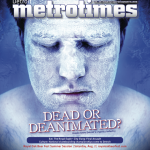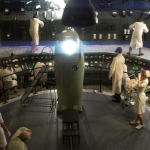Technology
Scale, proportion, and quantity belong to one of the cross cutting concepts in the next generation science standards (NGSS). According to Volume 2 of the NGSS, "in engineering, no structure could be conceived much less constructed without the engineer's precise sense of scale." The authors go on to note that scale and proportion are best understood using the scientific practice of working with models.
When scientists and engineers work with these concepts at a molecular scale, new kinds of technologies can be created to advance our understanding of…
What is the role of the ocean's abyss in global warming?1
I’ve already posted on a study published in Nature Climate change that shows that the amount of extra global warming related heat in the Southern Oceans is greater than previously thought. There is another paper in the same journal by Llovel et al, “Deep-ocean contribution to sea level and energy budget not detectable over the past decade.” This paper verifies previous research that the oceans absorb a lot of the excess heat, but looks specifically at the ocean below 2,000 meters, which the paper referrs to in places as "deep" but that…
Regular readers know that I’ve been a big Star Trek geek (more or less) ever since I first discovered reruns of the original Star Trek episodes in the 1970s, having been too young (but not by much!) to have caught the show during its original 1966-1969 run. True, my interest waxed and waned through the years—for instance, I loved Star Trek: The Next Generation, while Star Trek: Enterprise and Star Trek: Voyager pretty much left me cold—but even now I still find myself liking the rebooted movie series. In the original series, my favorite characters tended to alternate between Spock, the Vulcan…
As I so love to remind my readers, I’ve been at this blogging thing a long time now. In early December, it will have been a full decade since that strange, cold, dreary winter afternoon (well, technically late fall) when, inspired by an article in TIME Magazine about blogging, sat down in front of my computer, went to Blogspot.com and created the first iteration of Respectful Insolence. At first my output was intermittent, but within a couple of months I was posting virtually every day, a habit that’s continued to this very day. About a year after my very first post, I was invited to join…
The ‘Nifty Fifty (times 4)’, a program of Science Spark, presented by InfoComm International, are a group of 200 noted science and engineering professionals who will fan out across the Washington, D.C. area in the 2014-2015 school year to speak about their work and careers at various middle and high schools.
Meet Nifty Fifty Speaker Dr. Dan Werthimer
The great debate continues: Are we the only intelligent life in the universe? We know that popular science fiction often portrays our Milky Way Galaxy as teeming with advanced civilizations engaged in interstellar communication, commerce,…
There are times when supporting science-based health policy and opposing health policies that sound compassionate but are not are easily portrayed as though I’m opposing mom, apple pie, and the American flag. One such type of misguided policy that I’ve opposed is a category of bills that have been finding their way into state legislatures lately known as “right to try” bills. Jann Bellamy over at SBM and I have both written about them before. With the passage of the first such bill into law in Colorado in May, followed by Missouri and Louisiana, and its heading to the voters of Arizona as…
We all seek immortality in some way. Death has been a terror of nearly all since humans first started realizing that everybody dies. After all, no one wants to face the end of everything that one has been, is, and will be, so much so that a key feature of many religions is a belief that death is not the end, that there is an afterlife where we will all live forever and where evil is punished and good rewarded. Even if, as seems most likely, death is simply the end, and the time after death is just like the time before we were born (or, more properly, before our first memories), something that…
By Anthony Robbins, MD, MPA
So screams a headline in the New York Times business section on July 12, 2014. Two of the three tobacco companies in the $100 billion US market plan to merge.
Fifty years after the Surgeon General’s first report on Tobacco and Health, the US tobacco industry is working to grow its profits. Will the universal consensus that cigarettes kill have any effect on a government decision whether to intervene in the proposed merger? The Government usually gets involved when a merger would reduce the number of sellers in the market, possibly reducing competition…
I've seen a bunch of people linking approvingly to this piece about the "Fermi paradox," (the question of why we haven't seen any evidence of other advanced civilizations) and I can't quite understand why. The author expends a good deal of snark taking astronomers and physicists to task for constructing elaborate solutions to Fermi paradox on the basis of shoddy and unjustified assumptions. And then proceeds to offer a different solution for the Fermi paradox based on shoddy and unjustified assumptions. Whee!
I mean, there is an element of this that's useful, namely the reminder that "We…
Although I'm a translational researcher, I'm also a surgeon. That was my first and primary training and only later did I decide to get my PhD during my residency, when the opportunity to do so with a decent stipend presented itself. From my perspective, clinical research in surgery is difficult, arguably more difficult than it is for other medical modalities, at least in some ways. For instance, in surgery, it usually very difficult to do a double-blind placebo-controlled trial. For one thing, doing "sham" surgery on patients in the placebo arm is ethically dicey, and it's very hard to…
A key concept in science is molecular scale. DNA is a fascinating molecule in this regard.
While we cannot "see" DNA molecules without the aid of advanced technology, a full length DNA molecule can be very long. In human cells, other than sperm and eggs, six billion base pairs of DNA are packaged into 22 pairs of chromosomes, plus two sex chromosomes. Each base pair is 34 angstroms in length (.34 nanometers, or ~0.3 billionths of a meter), so six billion base pairs (all chromosomes laid out head to toe) form a chain that's two-meters long. If we could hang this DNA chain from a hook, it…
The Global Warming Policy Foundation is an organization of mainly economists dedicated to mucking up the development and advancement of good science-based policy related to climate change. It is a denialist "think" tank.
A couple of weeks ago, Swedish meteorologist Lennart Bengtsson joined the GWPF. This was a little surprising, but not totally surprising. It was surprising because Bengtsson is scientist and the foundation is anti-science and, as I noted, mostly economists. (Well, they are sort of like scientists too, but a different kind of science.) It was not surprising because…
This is the paper to read: Palazzo & Gregory's The Case for Junk DNA. It clearly and logically lays out the complete argument from evidence and theory for the thesis that most of the genome is junk. It's not revolutionary or radical, though: the whole story is based on very fundamental population genetics and molecular biology, and many decades of accumulated observations. And once you know a little bit of those disciplines -- you don't need to be a genius with a great depth of understanding -- the conclusion is both obvious and in some ways, rather trivial.
Here's that conclusion:
For…
“If the world wants you, it's gonna keep on coming till it gets you. And who am I that can fix it? Who am I that can change this if the world wants it so badly? Who am I to stop the end of the world if it keeps on coming?” -Patrick Ness
It's been a wonderful and diverse week over at the main Starts With A Bang blog on Medium, and we've covered an awful lot of ground if you missed anything (or want a re-read), including:
Using up the Universe's Fuel (for Ask Ethan),
LEGOs for those with a little Curiosity (for our Weekend Diversion),
An Elliptical Rotating Wrongly, M59 (for Messier Monday),…
“The atoms become like a moth, seeking out the region of higher laser intensity.” -Steven Chu
Sure, lasers are fascinating entities. By stimulating the right medium with the right conditions, you can induce the stimulated emission of radiation of the same exact wavelength in the same exact direction over and over again.
Image credit: Q-LINE Laser pointers, via Wikimedia Commons user Netweb01, under a c.c.-by-3.0 license.
But is there a limit to the amount of energy that can be produced by a laser? And if so, what is that limit, and might it be overcome by future technological advances, or…
By Guest Blogger Jason Osborne
Explorer, Innovator, and co-founder of both Paleo Quest™, a non-profit citizen science organization, and SharkFinder™
When most people think about scuba diving, they envision coral reefs and colorful tropical fish. But for me and my fellow professional-amateur paleontologist Aaron Alford, this is not the case. As the cofounders of non-profit organization Paleo Quest, diving is a tool for us. It is a method we use to reach places most people wouldn’t dare to explore.
Imagine diving in a river with zero visibility and heavy currents – and throw in some…
Guest Blog By Bart Gordon
Our nation has a long and proud history as a global leader in the development of technological breakthroughs and the development of revolutionary products that change and save lives around the world. In recent years, however, fewer young Americans are entering fields of science, technology, engineering and math (STEM) and as a result, our global competitiveness is in jeopardy. For the past six years, the majority of patents issued by the U.S. Patent and Trademark Office have been awarded to international owners, and fewer American students are…
Many people know Walmart as the largest corporate retailer in the world, but did you also realize it is a leading innovator and employer in STEM? At Festival Expo 2014, you'll discover in unforgettable ways this other side of Walmart, which this year is serving as an Americum-level Sponsor of the Festival!
Walmart's imprint on STEM is significant worldwide, and is especially noted for: developing ways to make its foods more healthful by reducing sodium, sugar and fat; designing high-tech fleet trucks; working with farmers to produce better crop yields; creating energy-…
I'm not really a comic-book guy, but I've watched a bunch of comic-book movies recently. Kate was really fired up for the new Captain America movie, so I finally got around to watching the first one as background for that, then when I was sleep-deprived last week I watched the second Thor movie via on-demand cable, then Sunday evening Kate and I went to see Captain America: The Winter Soldier in the theater (her second time watching it-- she's really fired up).
Mostly, this has served to confirm that I'm not a comic-book guy. I'm just not invested enough in the idea of a movie about these…
As part of the celebrations for Canada's upcomming 150th birthday, the Canadian federal government has released its Digital Canada 150 strategy paper, and while it`s not all bad, at the same time there is not an awful lot to recommend it. Especially considering it was four years in the making.
My sense is that its main purpose is for the Harper Conservative government to be able to say it has a digital strategy during the next election campaign in 2015. The most telling thing about the strategy, of course, is which department it originated in: Industry Canada. Not Culture, not Heritage, not…











